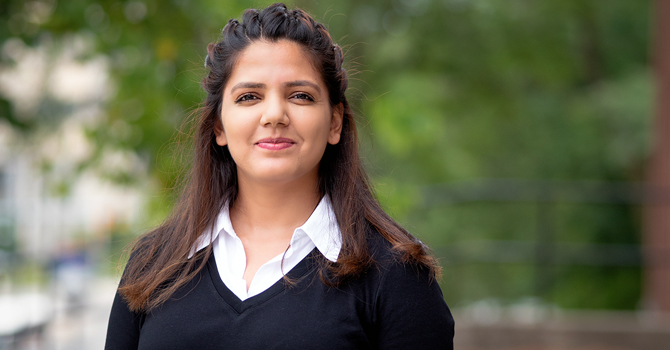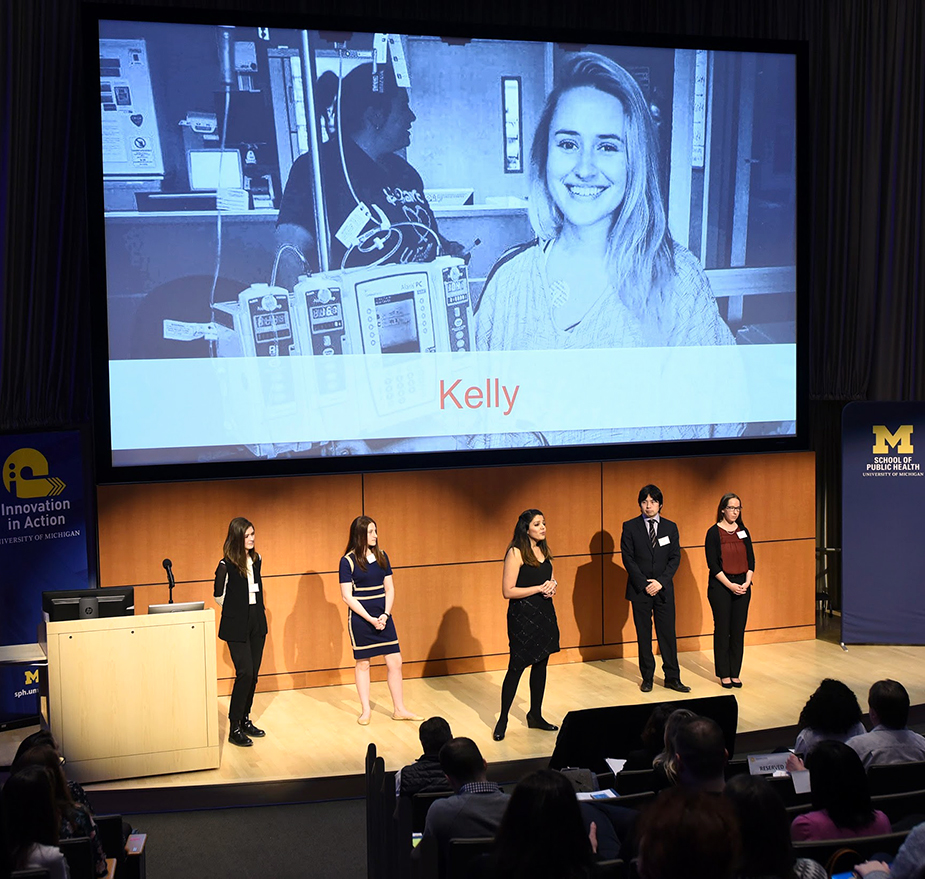Physician, Innovator, Advocate

Kashvi Gupta
Master’s Student in Global Health Epidemiology, Gelman Global Scholar
I didn't like needles. And I hated the smell of the hospital. These were pretty big problems for me, because I am a physician.
In India, you earn your MD as an undergraduate degree. When I graduated from high school, I had the option of pursuing a career in design or in medicine. My decision to pursue medicine at the time was not purpose driven. I had been an excellent student throughout my schooling, and those who knew me assumed medicine was the right profession for me. But for a longtime I resisted a career in medicine. My education was very important to my mother, as we had lost my father when I was only 12 years old. As I would find out later, my mother saw something in me that I could not see in myself.
My decision to pursue medicine at the time was not purpose driven.
Despite my dislike for needles and hospitals, I started on the path of becoming a physician. The medical school curriculum is rigorous, requiring not only stamina and determination but a sense of purpose to be able to get through it. In my second year, as I began my pulmonology rotation, I started to realize that I actually loved being a doctor. Reading about diseases in textbooks, then hearing about the symptoms from patients and taking steps to alleviate pain and provide comfort was an extraordinary experience for me.
I graduated from medical school and worked for a year as an intern doctor in India. I then did five months of clinical training in the US and spent a month in Ireland as a medical student to get experience working in global settings.
As a student at Henry Ford Hospital in Detroit, I worked in cardiothoracic surgery and scrubbed in for a few surgical procedures, including a heart transplant. During this time, a patient helped me realize I wanted to become a cardiothoracic surgeon. We admitted a 19-year-old woman with heart failure, and her only prognosis was a heart transplant. We spent a lot of time together, talking about life, what she'd to if she got a heart and survived the transplant.
A patient is more than just their complaints. You have to know their whole story and what this particular intervention will mean for them in their whole life.
We tend to see patients as having one job—being sick—and physicians as having one job—to make patients well. But to talk to someone in pain, to hear their story, to be part of their healing—it should change you. That 19-year-old taught me the most valuable lesson about medicine: that there is a complete person there in the exam room with us. Spending time with patients changes my life every day.
A patient is more than just their complaints. You have to know their whole story and what this particular intervention will mean for them in their whole life. If you don't address those concerns holistically, you might not have success with your medical intervention, and you certainly won't be as successful as you could be. For example, I've known patients who would resist an amputation even though it was their only way to survive their condition. We would then talk about all kinds of things that went well beyond the actual surgery.
The admissions process at Michigan Public Health was so personal and helped the school stand out to me. The faculty's direct outreach to international students made a difference to me, and my mentors here in epidemiology have given me every opportunity to learn and to excel.
I came to the School of Public Health wanting to learn the skills of epidemiology and develop a deeper understanding of health disparities. In my first year, the Innovation in Action competition provided an unexpected opportunity: to develop a social entrepreneurship project for tackling a public health challenge. Organ donation was on my mind, of course, but I hadn't ever thought of it as a public health challenge.
 After four months of intensive research and a pivotal conversation with a transplant
coordinator, I had the idea of improving how we register organ donors in alternative
settings to the Secretary of State Office (or Department for Motor Vehicles). Our
project, Donum, was an interactive web-based application that prompted first-year
students to register as organ donors during the admissions process.
After four months of intensive research and a pivotal conversation with a transplant
coordinator, I had the idea of improving how we register organ donors in alternative
settings to the Secretary of State Office (or Department for Motor Vehicles). Our
project, Donum, was an interactive web-based application that prompted first-year
students to register as organ donors during the admissions process.
My engagement with Innovation in Action reinvigorated my sense of purpose in becoming a cardiothoracic surgeon, in pursuing sustainability for nonprofits, and in helping families understand how organ donation can be a truly profound experience. So much more needs to be accomplished in this area—and Innovation in Action was a catalyst in moving us all closer to some of those goals.
When I started out, I didn't like needles. But now I've held someone's heart. I've even made an incision for a heart surgery.
My journey through medical training and now to public health is characterized by a passion for helping others and by my own openness to change and challenge. When I started out, I didn't like needles. But now I've held someone's heart. I've even made an incision for a heart surgery. I am grateful to my mother for seeing my journey differently than I, as a young person, was seeing it. She saw something I didn't, and it has turned out well for everyone. Today, she reminds me that I am successful not because I listened to her but because I've found my purpose in life and am embracing that calling. I could have gone in my own direction, but we worked together to help me find my way.
